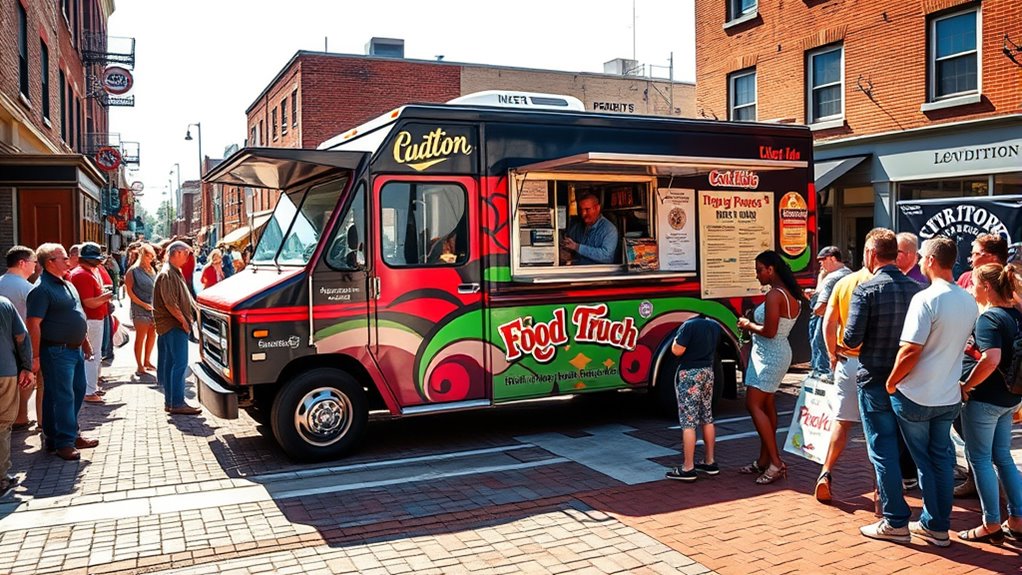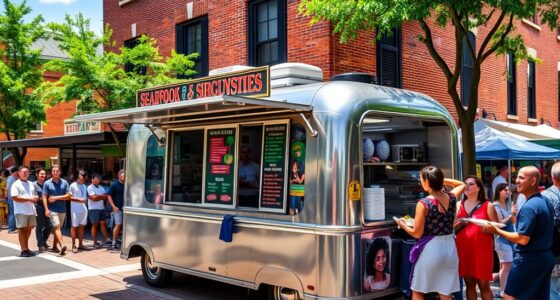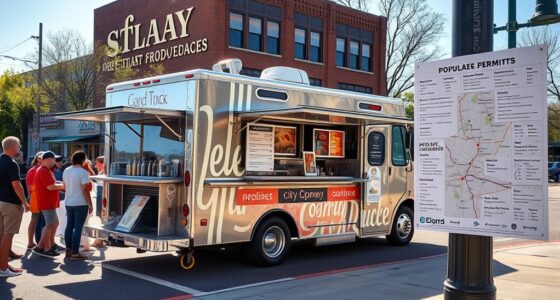To open a food truck in Lewiston, Maine, you’ll need to secure a Mobile Food Service License from the state and a city license, both requiring applications and inspections. Budget around $35,000 to $150,000 for your truck and setup, plus ongoing costs for permits, insurance, and supplies. Choose busy locations while respecting local rules, design an appealing menu, and use social media for marketing. For detailed steps and tips, explore these essential steps further.
Key Takeaways
- Obtain required licenses from Maine DHHS and Lewiston city, including health, fire safety, and location permits, with early application to avoid delays.
- Budget for initial costs between $35,000–$150,000, covering truck purchase, licensing, permits, insurance, and initial supplies.
- Select high-traffic, legal locations like downtown, parks, or community events, ensuring compliance with minimum distance and zoning regulations.
- Design a simple, appealing menu with 5–12 items focusing on quality, speed, and branding, utilizing digital menus and strategic item placement.
- Promote your food truck through social media, local collaborations, and community events to build visibility and attract diverse customers.
Navigating Licensing and Permits in Lewiston
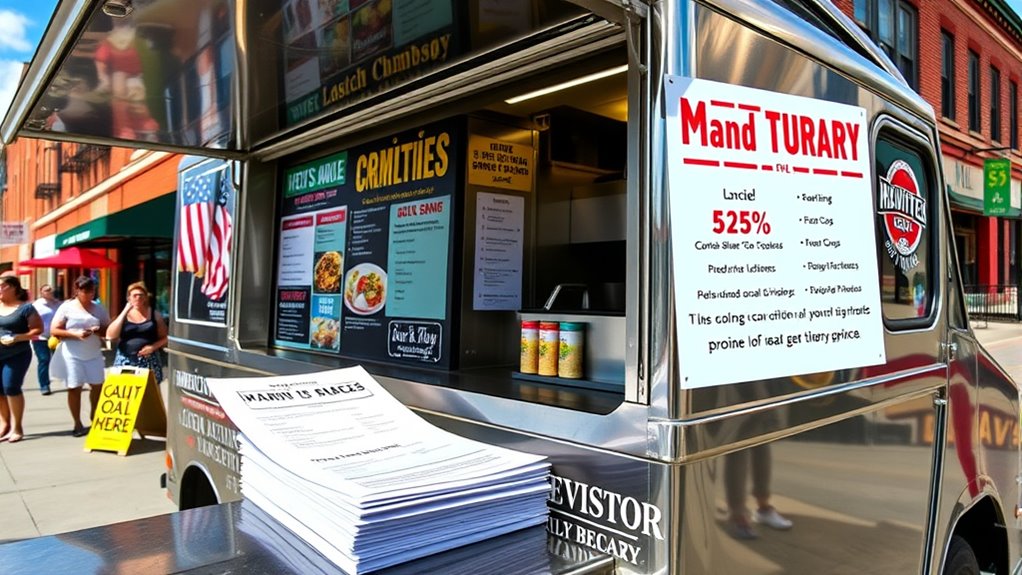
Are you ready to launch your food truck in Lewiston? First, you need to obtain a Mobile Food Service License from the Maine Department of Health and Human Services (DHHS). This license confirms your compliance with health and safety standards, covering food storage, sanitation, and water supply. You’ll need to submit a complete application at least 30 days before starting, and a pre-operational inspection is required after approval. The license is valid for a year and must be posted on your truck. Additionally, you’ll need a separate Lewiston city license, which requires presenting your state license and submitting a site plan, menu, and equipment list. Remember, trucks must stay at least 100 feet from restaurants, and fire safety approval is also mandatory. Obtaining the city license often involves paying a fee and may require proof of insurance and additional inspections depending on local regulations. Ensuring compliance with health standards is essential for a smooth licensing process and ongoing operation.
Understanding Costs and Budgeting for Your Food Truck Business
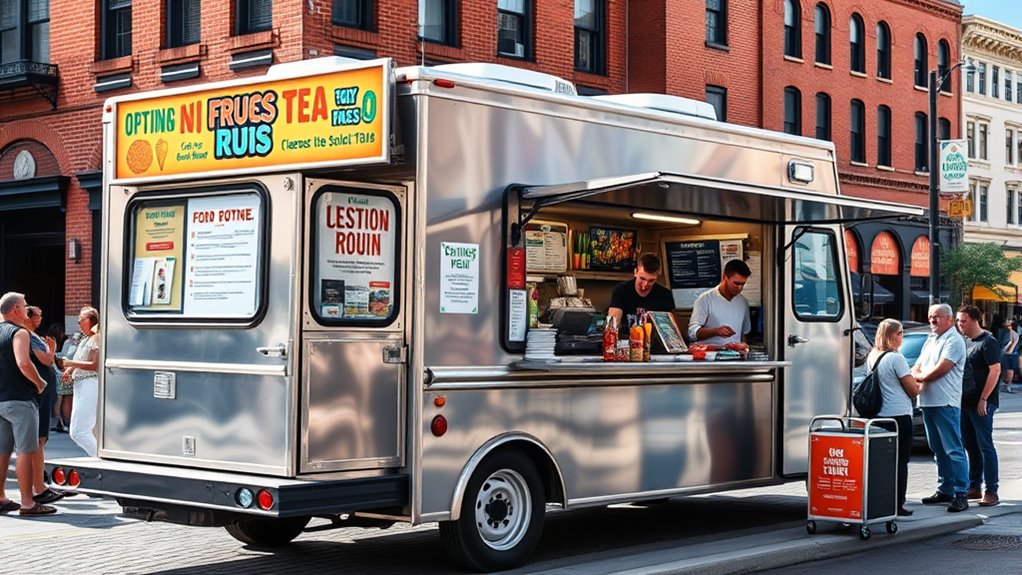
Understanding your costs and creating a solid budget are vital for launching your food truck in Lewiston. You’ll need to account for initial investments, ongoing expenses, and permit fees to keep your business running smoothly. Planning carefully helps you avoid surprises and sets a clear path to profitability. Accurately estimating startup costs allows you to secure the necessary funding and manage cash flow effectively from the outset. Additionally, considering equipment choices such as airless paint sprayers can be relevant if you need to customize or refurbish your vehicle or setup.
Initial Capital Investment
Starting a food truck business in Lewiston, Maine requires careful planning of your initial investment, as costs can vary widely based on your choices. You’ll need to budget between $35,000 and $150,000+ for your truck purchase and outfitting, depending on whether you buy used or new, and how much customization you require. Permits, licenses, and certifications—like health and safety licenses—can add a few hundred to over a thousand dollars. If you rent a commissary, expect monthly fees from $400 to $1,200, plus initial inventory costs around $1,000 to $3,000. Don’t forget additional expenses for supplies, marketing, and equipment. Startup costs for food trucks in Maine. Setting a clear budget upfront helps you navigate these costs and set realistic financial goals for your food truck venture. Additionally, understanding cost variability in outfitting and licensing ensures you’re prepared for unexpected expenses.
Ongoing Operational Expenses
After securing your initial investment, managing ongoing expenses becomes key to keeping your food truck business profitable. Fuel and maintenance costs can range from $300 to $700 monthly, depending on hours and travel distance, with repairs potentially adding $1,000 to $3,000 annually. Regular mechanical upkeep, ventilation, and fire suppression system maintenance are essential and may involve additional costs. Food and supply expenses vary weekly or biweekly, averaging $200 to $500 monthly for packaging and utensils. Staffing costs, including wages and certifications, often form a significant part of your budget, with ongoing training necessary. Additionally, licensing, inspection, insurance, marketing, and promotional activities are continuous expenses to plan for, ensuring your business remains compliant, competitive, and visible in Lewiston’s vibrant food scene. Proper record-keeping is also vital to track these expenses accurately and optimize your budget over time. To effectively manage your ongoing expenses, developing a detailed budget plan and regularly reviewing your financial statements will help maintain profitability and adapt to changing costs.
Licensing and Permit Fees
Securing the necessary licensing and permits is a crucial step for legally operating your food truck in Lewiston, Maine. State licensing fees include a $20 annual Mobile Vendor license for selling prepared, packaged foods, and a Health Inspection Program (HIP) license from Maine DHHS for food preparation and serving. You must also obtain a city mobile unit license, along with specific location permits, such as near Mill 5 on Main Street. Fees vary depending on vehicle registration, inspection, and fire safety requirements. Additionally, understanding local regulations can help ensure compliance with all zoning and safety standards.
Prime Locations to Maximize Visibility and Customer Flow
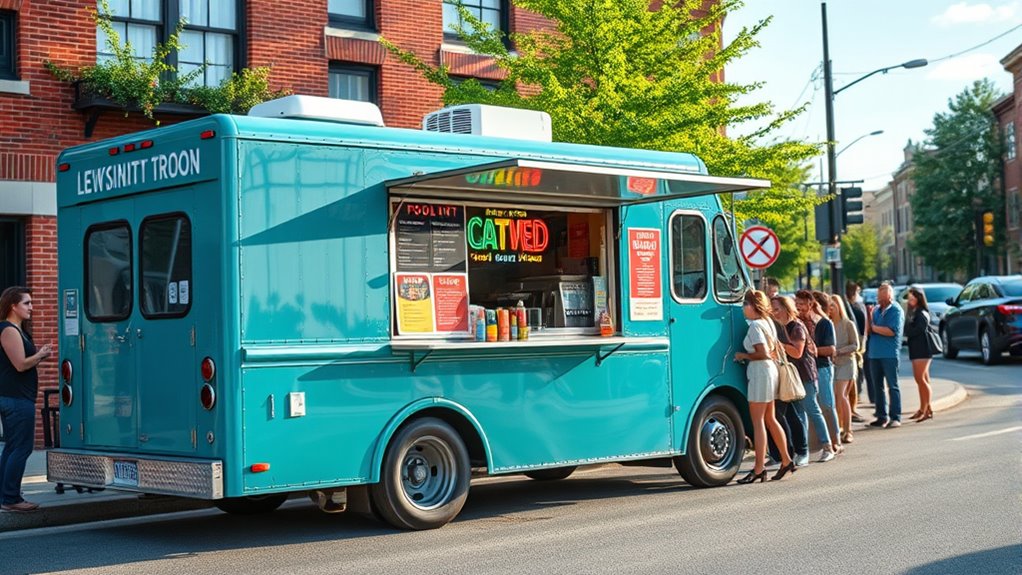
To maximize visibility and attract steady customer flow, focus on high-traffic areas like Mill 5 near the Hopeful sign on Main Street, which sees around 30,000 vehicles daily. Locations near major community destinations such as hospitals, government buildings, and business districts boost exposure. Pedestrian-friendly zones and commercial areas also increase walk-up traffic. Remember, city ordinances require a minimum 100-foot distance from existing restaurants to avoid competition. Parks, event venues, and downtown spaces naturally draw crowds, making them ideal spots. Positioning near corporate parks, conferences, festivals, and community events expands your reach. High-traffic intersections, public transit hubs, and well-lit areas during evening hours help extend your service times and attract diverse customers. According to local regulations, strategic site selection is key to building visibility and consistent sales. Additionally, choosing locations with nearby bike-friendly infrastructure can attract cycling enthusiasts and support eco-friendly branding.
Crafting a Menu That Delights and Performs in a Mobile Setting

Designing a menu that both delights customers and performs well in a mobile setting starts with strategic choices about item selection and presentation. Keep your menu between 5-12 items to guarantee quality and quick service, focusing on 8-15 main dishes that minimize confusion. Use recurring ingredients to streamline prep and reduce waste, highlighting three to five key items to draw attention. Position high-profit and signature dishes in the top right “golden triangle” for increased sales, with best-sellers in prominent areas. Keep the menu simple with clear fonts, ample spacing, and appealing visuals. Incorporate aesthetic presentation to make dishes more enticing and memorable. Design dishes for fast prep, avoiding complex recipes that slow service. Use digital boards for updates and branding consistency to create an attractive, efficient, and customer-friendly menu that stands out in Lewiston. Hamburgers are a popular choice due to their high customization potential and appeal across diverse customer preferences.
Effective Marketing Strategies to Grow Your Food Truck Presence
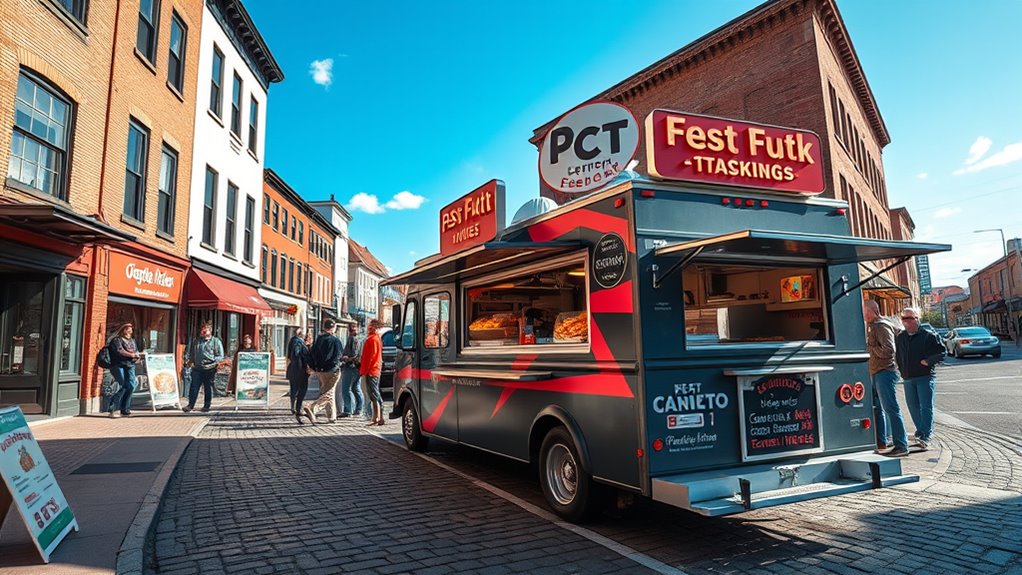
Building a strong marketing presence is essential for growing your food truck in Lewiston, Maine. Leverage social media platforms like Facebook, Instagram, and TikTok to reach local audiences. Post consistently during peak hours, especially in the evenings, and use location tags and relevant hashtags to attract nearby customers. Run targeted ads to connect with specific demographics interested in street food. Participating in festivals and community events boosts visibility and foot traffic—offer event-exclusive specials and partner with organizers for prime spots. Establish a memorable brand with clear branding elements and loyalty programs to encourage repeat business. Maintain an active online presence with an up-to-date website and listings on Google My Business and Yelp. Collaborate with local businesses, influencers, and organizations to expand your reach and build lasting relationships. Utilize local SEO strategies to enhance your online visibility in the Lewiston area by optimizing your website and online listings for location-specific keywords. Additionally, understanding Nissan tuning techniques can inspire creative branding or promotional events that highlight performance and quality, attracting a niche audience interested in automotive culture.
Ensuring Compliance and Overcoming Operational Challenges
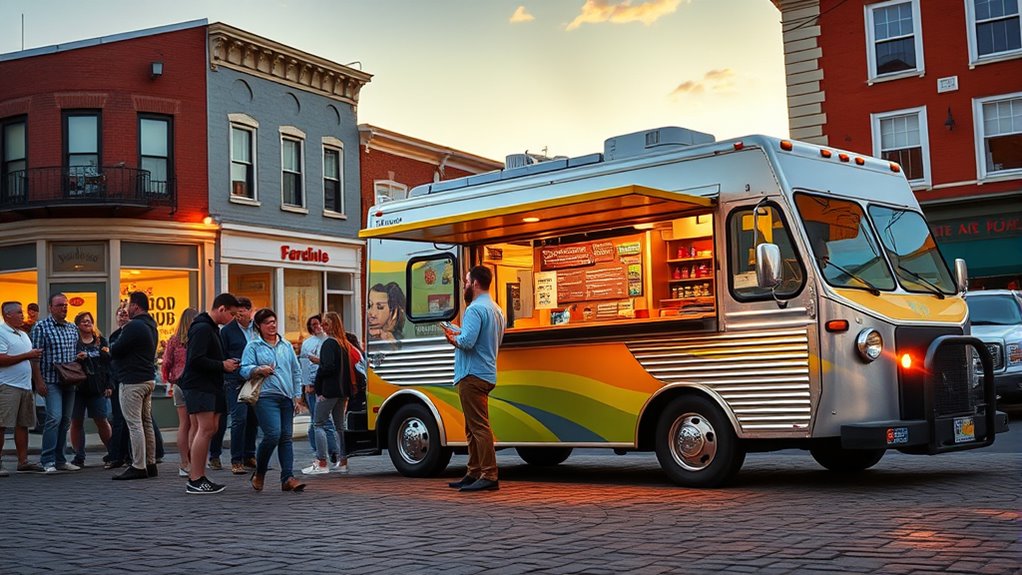
Operating a food truck in Lewiston requires strict adherence to licensing, safety standards, and location rules to avoid fines or suspension. You must obtain both a City of Lewiston and Maine state mobile unit license, which involve thorough health, fire, and safety inspections. Submit your applications at least 30 days in advance, ensuring all paperwork is complete for review and pre-inspection. Your truck must meet Maine regulations, including proper food storage, sanitation, and fire suppression systems. You’ll also need at least $400,000 in liability insurance. Place your truck in legal, accessible spots without blocking traffic or violating minimum distance rules from other restaurants. Regular inspections ensure ongoing compliance, helping you avoid penalties and maintain your license while providing safe, community-friendly service. Proper planning and early regulatory compliance help prevent costly delays and ensure a smooth launch for your food truck business. Additionally, understanding local zoning and parking regulations can further facilitate a seamless operation and prevent potential legal issues.
Frequently Asked Questions
How Long Does the Entire Licensing Process Typically Take in Lewiston?
The licensing process in Lewiston usually takes about 30 days from application submission to approval if everything goes smoothly. You need to prepare your documents, schedule inspections, and respond promptly to any requests. Delays can happen if inspections need rescheduling or if your application is incomplete. By coordinating health and fire inspections and staying proactive, you can help speed up the process and get your food truck ready sooner.
Are There Specific Insurance Requirements for Operating a Food Truck in Lewiston?
You’ll need to meet specific insurance requirements to operate your food truck in Lewiston. Make sure you have general liability insurance to protect against customer injuries, and business auto insurance with at least $50,000 per person and $100,000 per accident liability coverage. Workers’ compensation is also mandatory if you have employees. Keep a valid Certificate of Insurance, and verify your policies align with state and local regulations for smooth operation.
Can I Operate a Food Truck Without a Commissary License in Lewiston?
You can operate a food truck without a commissary license in Lewiston only if your truck is fully self-sufficient. That means you handle all food prep, storage, and dishwashing on board. If your truck relies on external kitchens or washing facilities, you’ll need a commissary license, which involves fees, inspections, and compliance with health regulations. Operating without one when required can lead to fines or closure.
What Are the Peak Hours to Target for Maximum Sales in Lewiston?
Hitting the nail on the head, your best peak hours are during Lewiston’s busy times: mornings from 7 to 9 a.m., lunchtime between 11:30 a.m. and 1:30 p.m., and early evenings from 5 to 7 p.m. This is when foot traffic peaks near Mill 5, hospitals, and downtown. For late-night sales, target private property hours until 1 a.m., especially during weekend events to catch night owls.
How Can I Find Available Permits and Designated Parking Spots in Lewiston?
You can find available permits and parking spots in Lewiston by contacting local authorities directly. Start with the Maine Department of Health and Human Services to get your Mobile Food Service License, and then reach out to the Lewiston City Office for the mobile unit license and zoning rules. Visit designated spots like Mill 5 near the Hopeful sign, but always double-check current regulations and parking restrictions with city officials to stay compliant.
Conclusion
Starting your food truck in Lewiston is a game-changer—you’re not just opening a business, you’re creating a culinary revolution on wheels. With the right permits, a killer menu, and strategic marketing, you can dominate the local scene. Stay compliant and adapt quickly, and you’ll turn your dream into a thriving venture faster than you can say “food truck frenzy.” Get ready to make Lewiston’s streets your culinary playground!
